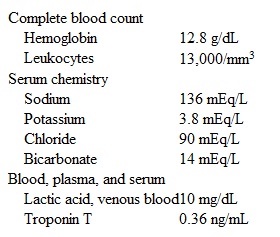A 44-year-old man is rescued from a house fire and brought to the emergency department with nausea, headache, and altered mental status. The fire likely began due to the stove accidently being left on overnight. He has no chronic medical problems and takes no medications. The patient had smoked a pack of cigarettes a day for 10 years but quit several years ago. He does not use illicit drugs. Temperature is 36.7 C (98 F) , blood pressure is 110/70 mm Hg, pulse is 112/min, and respirations are 28/min. Pulse oximetry is 97% on room air. The patient has soot around the mouth and oropharynx, flushed cheeks, pink palmar skin, and breath that smells strongly of smoke. He is lethargic but has spontaneous movement in all extremities. Cardiopulmonary auscultation reveals clear lung fields and normal heart sounds with occasional ectopic beats. Laboratory results are as follows:  Chest-x ray reveals no infiltrates. ECG shows T-wave inversions in leads I, aVL, V5, and V6 that were not present on previous ECGs. Which of the following is most likely to confirm the underlying diagnosis?
Chest-x ray reveals no infiltrates. ECG shows T-wave inversions in leads I, aVL, V5, and V6 that were not present on previous ECGs. Which of the following is most likely to confirm the underlying diagnosis?
A) Coronary artery catheterization
B) Measurement of arterial blood PO2
C) Measurement of carboxyhemoglobin
D) Measurement of methemoglobin
E) Urine toxicology screening
Correct Answer:
Verified
Q400: A 26-year-old Caucasian male presents to the emergency
Q401: A 33-year-old woman, gravida 2 para 1
Q402: A 23-year-old Caucasian male presents to the
Q403: A 29-year-old woman, gravida 0 para 0,
Q404: A 6-month-old boy is brought to the
Q406: A 44-year-old man comes to the office
Q407: A 22-year-old woman comes to the office
Q408: A 19-year-old woman, gravida 1 para 0,
Q409: A 3-hour-old girl is evaluated in the
Q410: A 6-month-old boy is brought to the
Unlock this Answer For Free Now!
View this answer and more for free by performing one of the following actions

Scan the QR code to install the App and get 2 free unlocks

Unlock quizzes for free by uploading documents